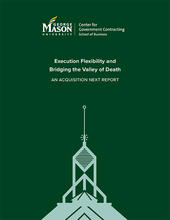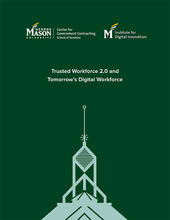- June 26, 2023
Developing an effective “Build Allied” approach will help the Department of Defense create surge capacity, with both speed and scale, and industrial resilience in support of the National Defense Strategy (NDS) objectives.
- April 28, 2023
The Statement of Objectives (SOO), available in Appendix 1, defines the overall objective of this study: “Identify the obstacles for small businesses to obtain financing in the private sector as well as when doing business with the Department of Defense.” (DoD) This final report addresses this objective, following the structure of the SOO.
- April 28, 2023
In support of the Office of Defense Pricing & Contracting’s Contract Financing/Cost and Pricing Study, George Mason University’s Center for Government Contracting examined government accounting system requirements and their impact on commercial company participation in defense contracts.
- April 28, 2023
This project focused on three research questions, over the period 2000 through 2019: A. Did free cash flow (FCF) increase or decrease over time? For what was FCF being used, and did that change over time? Was there a relationship between FCF and independent research and development (IR&D)?
- January 26, 2023
Report to the Laboratories and Personnel Office, Office of the Under Secretary of Defense for Research and Engineering, U.S. Department of Defense in response to the FY2020 NDAA requirement for "the Under Secretary of Defense for Research and Engineering to enter into an arrangement with a university business school or law school with resident economics and intellectual property expertise to conduct an independent assessment of the Defense Advanced Research Projects Agency’s and defense laboratories’ contracting and intellectual property management policies and their effects on the commercialization of and innovation in dual-use technology."
- October 26, 2022
While the platform-based defense budgeting system works well for large capital investments, many other capital investments such as the Joint All-Domain Command and Control (JADC2) concept require modular, cross-cutting technologies that do not fit well into program stovepipes. Even when all stakeholders are aligned, there are precious few opportunities to get funding within the traditional resource allocation process. This creates a proverbial “valley of death” that frustrates everyone involved. What types of strategies can inject the execution flexibility necessary to bridge this valley of death and get capabilities in the hands of warfighters?
- February 9, 2022
To ensure overmatch against strategic adversaries like Russia and China, the defense acquisition system does not need a new set of reforms but rather a change in mindset. The Center for Government Contracting calls this change in mindset and approach "Acquisition Next." It seeks to replace industrial age paradigm of linearity and prediction with the modern approaches of modularity, speed, iteration, and competition. This playbook suggests a way to implement the Acquisition Next mindset.
- August 2, 2022
This report outlines the results of a workshop discussion on Trusted Workforce 2.0 (TW 2.0) implementation and academic initiatives to educate and train today and tomorrow’s cleared government contracting workforce.
- July 20, 2022
The Center for Government Contracting releases a new report, “The Power of Many: Leveraging Consortia to Promote Innovation, Expand the Defense Industrial Base, and Accelerate Acquisition.”





